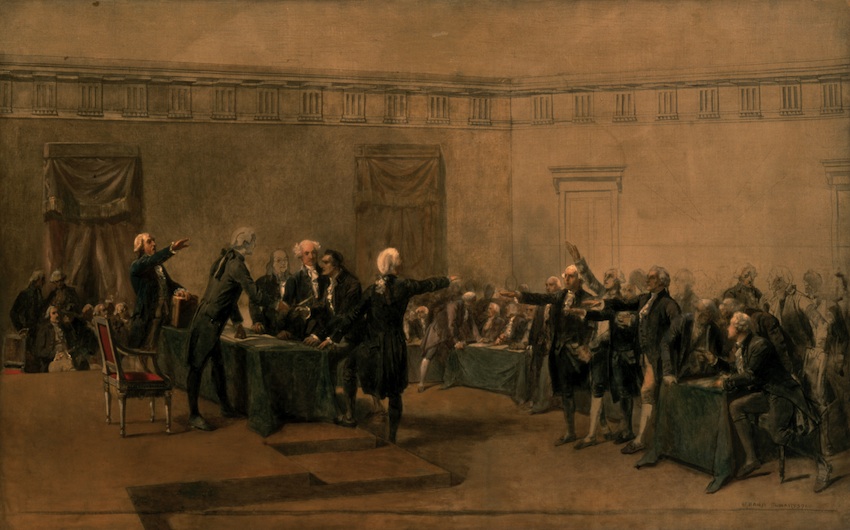Throwback Thursday: When John Adams Thought Independence Day Was July 2

“Signing of Declaration of Independence” by Armand-Dumaresq via Wikimedia Commons
On July 3rd, 1776 in Philadelphia, John Adams wrote a letter to his wife Abigail in Braintree, Massachusetts predicting that one day, his newly formed nation would look back on the momentous events of that week and celebrate. He got just one thing wrong. “The Second Day of July 1776, will be the most memorable Epocha, in the History of America,” he told her:
I am apt to believe that it will be celebrated, by succeeding Generations, as the great anniversary Festival. It ought to be commemorated, as the Day of Deliverance by solemn Acts of Devotion to God Almighty. It ought to be solemnized with Pomp and Parade, with Shews, Games, Sports, Guns, Bells, Bonfires and Illuminations from one End of this Continent to the other from this Time forward forever more.
Given that you probably spent July 2 at your desk, no games, sports, guns, bells, bonfires, or illuminations in sight, you might ask yourself, “What gives, John Adams?” It was on July 2 that the Continental Congress actually voted aloud to declare independence. In Adams’s mind, that was the most important moment, the one where the new nation’s fate was sealed.
So where did July 4th come from? Between the Second and the Fourth, the Congress deliberated over the exact language in the written Declaration of Independence. On the Fourth, Congress took a second vote to ratify its final version. Most of the signing didn’t happen until August 2, but the fact that the Declaration itself says, “IN CONGRESS, July 4, 1776,” at the top would later make it a good candidate for the celebration day. Still, Adams biographer David McCullough thinks his subject had a point about July 2:
Adams, who had responded with such depth of feeling to the events of July 2, recorded not a word of July 4. Of Jefferson’s day, it is known only that he took time off to shop for ladies’ gloves and a new thermometer.
It doesn’t sound like a very auspicious first anniversary. But both Adams and Jefferson would come to recognize July 4, not July 2, as the “great anniversary Festival” that Adams had predicted. By 1778, Adams had already come around, hosting a celebration on the 4th in Paris with Benjamin Franklin. It would come to have poetic significance, too, in 1826, on the 50th anniversary of the second vote, when the aged Adams and Jefferson died on that same day. This time, his son President John Quincy Adams had no doubt of the significance of July 4. He wrote in his diary, “The time, the manner, the coincidence … are visible and palpable marks of divine favor.” Given that God was on July 4th’s side, did July 2 really stand a chance?

